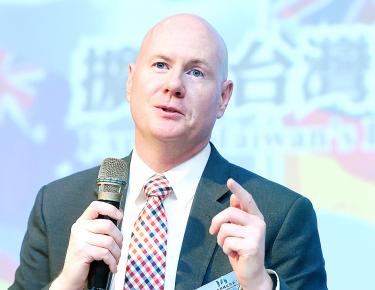As US President Donald Trump’s administration is committed to its “America first” foreign policy, Taiwan-US relations should be reoriented toward increased business ties, defense cooperation and a high-level dialogue mechanism, Idaho Republican Party chairman Stephen Yates yesterday told a forum in Taipei organized by the World Taiwanese Congress and the Taiwan Nation Alliance.
Taiwan and the US share common interests that motivate bilateral exchanges, such as economic stability, defending against Chinese and Russian cyberattacks, and freedom of navigation through disputed waters, said Yates, a former US deputy national security adviser to former US vice president Dick Cheney.
However, Taiwan-US dialogue has been limited, as the level of US officials able to engage in bilateral talks is capped, Yates said.
“The communication has to be carried out by officials holding elected offices on both sides to be effective,” but the US has conducted the talks with non-elected officials from the US Department of State, Yates said.
The telephone call between President Tsai Ing-wen (蔡英文) and Trump in December last year might be a “one-off” that did not change the course of Taiwan-US relations, and both leaders should have a clear strategy for developing bilateral ties, he said.
Trump’s “rebalancing” emphasizes re-evaluating bilateral ties with US partners, which, in the Taiwan-US context, provides the opportunity of reframing the economic partnership, defense cooperation and non-governmental relations, he said.
The talks between Taiwan and the US over the bilateral Trade and Investment Framework Agreement (TIFA) should be replaced with a “new communication” under Trump’s administration, which might lead to a new economic framework akin to a free-trade agreement to deepen bilateral business ties, he said.
Under the rebalancing policy, the US is encouraging its allies to build up their defense capabilities using their own means and Taiwan should evaluate its defense spending in line with the goal of developing an independent defense, Yates said.
The US government does not welcome the notion of Taiwanese self-determination, so civil-level interactions should be key for Taiwan to deepen ties with the US, he said.
“A new priority of Taiwan-US relations should be built with increased interactions between Taiwan and individual American states, rather than, but not excluding, the US federal government,” Yates said.
The Taiwanese government should seek increased international participation outside the realm of UN and its affiliated organizations, Yates said.
The UN is a “corrupt” organization, the majority of whose members are non-democratic nations and it is questionable that a formal UN membership could right the injustice done to Taiwan, he said.
The US also needs to rename the “one China” policy, a term enforced on Washington by China to rein in the US’ Taiwan policy, he said.
Former Japanese vice minister of defense Akihisa Nagashima told the forum it remains to be seen how the mercurial Trump administration affects cross-strait relations and developments in the region as a whole.
Trump flirted with the possibility of modifying the US’ “one China” policy after his telephone call with Tsai, but in a February telephone call with Chinese President Xi Jinping (習近平), he changed tack and agreed to respect it, with the apparent flip-flop indicating that Trump’s decisions are difficult to predict, Nagashima said.
It remains uncertain if Trump plans to continue to respect the Taiwan Relations Act and provide arms to Taiwan, and Taipei should speed up its efforts to build up its defensive capabilities, as the cross-strait military balance is heavily tilted in China’s favor, he said.
Japan should deepen relations with Taiwan on the security and legal levels, and the Japanese National Security Council should establish an intelligence-sharing mechanism with its Taiwanese counterpart, he added.
In addition to a free-trade pact to be established between Taiwan and Japan, “Japan should also enact a ‘Japanese version of the Taiwan Relations Act’ to elevate the level of Taiwan-Japan relations to the level of Taiwan-US relations,” he said.
Source: Taipei Times - 2017/05/22





















